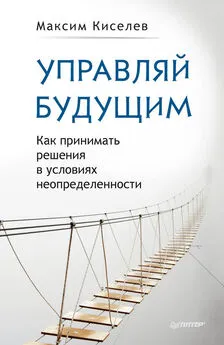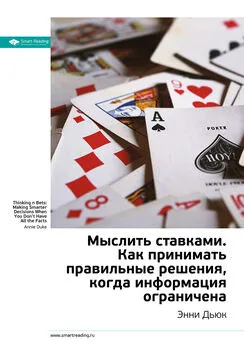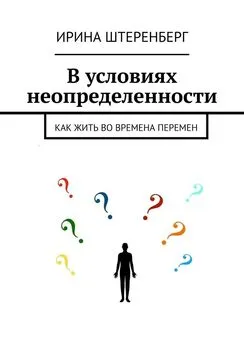Энни Дьюк - Принцип ставок. Как принимать решения в условиях неопределенности
- Название:Принцип ставок. Как принимать решения в условиях неопределенности
- Автор:
- Жанр:
- Издательство:Манн, Иванов и Фербер
- Год:2019
- Город:Москва
- ISBN:978-5-00146-047-3
- Рейтинг:
- Избранное:Добавить в избранное
-
Отзывы:
-
Ваша оценка:
Энни Дьюк - Принцип ставок. Как принимать решения в условиях неопределенности краткое содержание
Энни Дьюк — профессиональный игрок в покер, обладательница браслета Мировой серии покера и бизнес-консультант. Сумма ее призовых составляет несколько миллионов долларов, а среди ее клиентов голливудские звезды и крупные корпорации.
Принцип ставок. Как принимать решения в условиях неопределенности - читать онлайн бесплатно ознакомительный отрывок
Интервал:
Закладка:
Heider, Fritz. The Psychology of Interpersonal Relations . Hillsdale, NJ: Lawrence Erlbaum Assocs., 1958.
Hershfield, Hal. «You Make Better Decisions If You ‘See’ Your Senior Self». Harvard Business Review , June 2013, 30–1.
Hershfield, Hal, Daniel Goldstein, William Sharpe, Jesse Fox, Leo Yeykelis, Laura Carstensen, and Jeremy Bailenson. «Increasing Saving Behavior Through Age-Progressed Renderings of the Future Self». Journal of Mar keting Research 48 (November 2011): S23–S37.
Holmes, Jamie. Nonsense: The Power of Not Knowing . New York: Crown, 2015. Institute for Advanced Study. «John von Neumann’s Legacy». https://www.ias.edu/people/vonneumann/legacy.
Jiang, Wei, Hualin Wan, and Shan Zhao. «Reputation Concerns of Independent Directors: Evidence from Individual Director Voting». Review of Financial Studies 29, no. 3 (December 2015): 655–96.
Johnson, Hollyn, and Colleen Seifert. «Sources of the Continued Influence Effect: When Misinformation in Memory Affects Later Inferences». Journal of Experimental Psychology: Learning, Memory, and Cognition 20, no. 6 (November 1994): 1420–36.
Johnson-Laird, Philip. «Mental Models and Probabilistic Thinking». Cognition 50, no. 1 (June 1994): 189–209.
Kable, Joseph, and Paul Glimcher. «The Neural Correlates of Subjective Value During Intertemporal Choice». Nature Neuroscience 10, no. 12 (December 2007): 1625–33.
Kahan, Dan, David Hoffman, Donald Braman, Daniel Evans, and Jeffrey Rachlinsky. «‘They Saw a Protest’: Cognitive Illiberalism and the SpeechConduct Distinction». Stanford Law Review 64 (2012): 851–906.
Kahan, Dan, Ellen Peters, Erica Dawson, and Paul Slovic. «Motivated Numeracy and Enlightened Self-Government». Behavioural Public Policy 1, no. 1 (May 2017): 54–86.
Kahneman, Daniel. Thinking, Fast and Slow . New York: Farrar, Straus and Giroux, 2011.
Kahneman, Daniel, and Amos Tversky. «Prospect Theory: An Analysis of Decision Under Risk». Econometrica: Journal of the Econometric Society 47, no. 2 (March 1979): 263–91.
Katyal, Neil. «Washington Needs More Dissent Channels». New York Times , July 1, 2016. https://www.nytimes.com/2016/07/02/opinion/washington-needs-more-dissent-channels.html.
Katz, David, and Stephanie Meller. «Can We Say What Diet Is Best for Health?» Annual Review of Public Health 35 (March 2014): 83–103.
Kearns, Cristin, Laura Schmidt, and Stanton Glantz. «Sugar Industry and Coronary Heart Disease Research: A Historical Analysis of Internal Industry Documents». JAMA Internal Medicine 176, no. 11 (November 1, 2016): 1680–85.
Kestemont, Jenny, Ning Ma, Kris Baetens, Nikki Clément, Frank Van Overwalle, and Marie Vandekerckhove. «Neural Correlates of Attributing Causes to the Self, Another Person and the Situation». Social Cognitive and Affective Neuroscience 10, no. 1 (March 2014): 114–21.
Kiersz, Andy. «Here’s How Badly Warren Buffett Has Beaten the Market». Business Insider , February 26, 2016. http://www.businessinsider.com/warren-buffett-berkshire-hathaway-vs-sp-500-2016-2.
Kirwan, C. Brock, Stefania Ashby, and Michelle Nash. «Remembering and Imagining Differentially Engage the Hippocampus: A Multivariate fMRI Investigation». Cognitive Neuroscience 5, no. 3–4 (October 2014): 177–85.
Klein, Gary. «Performing a Project Premortem». Harvard Business Review , September 2007, 18–19.
Konnikova, Maria. The Confidence Game: Why We Fall for It… Every Time . New York: Penguin, 2016.
Konnikova, Maria. Mastermind: How to Think Like Sherlock Holmes . New York: Penguin, 2013.
Kriss, Peter, George Loewenstein, Xianghong Wang, and Roberto Weber. «Behind the Veil of Ignorance: Self-Serving Bias in Climate Change Negotiations». Judgment and Decision Making 6, no. 7 (October 2011): 602–15. Krusemark, Elizabeth, W. Keith Campbell, and Brett Clementz. «Attributions, Deception, and Event Related Potentials: An Investigation of the Self-Serving Bias». Psychophysiology 45, no. 4 (July 2008): 511–5.
Kuhn, Harold, Introduction to Theory of Games and Economic Behavior . 60th anniv. ed. Princeton, NJ: Princeton University Press, 2004.
Kuhn, Manford. «The Reference Group Reconsidered». Sociological Quarterly 5, no. 1 (January 1964): 5–19.
Lederer, Richard. Anguished English . Rev. exp. upd. ed. Layton, UT: Wyrick & Co., 2006. First published in 1987.
Leitch, Alexander. A Princeton Companion . Princeton, NJ: Princeton University Press, 1978. http://etcweb.princeton.edu/CampusWWW/Companion/von_neumann_john.html.
Leonard, Robert. «From Parlor Games to Social Science: Von Neumann, Morgenstern, and the Creation of Game Theory 1928–1944». Journal of Economic Literature 33 (June 1994): 730–61.
Lerner, Jennifer, and Philip Tetlock. «Accounting for the Effects of Accountability». Psychological Bulletin 125, no. 2 (March 1999): 255–75.
Lerner, Jennifer, and Philip Tetlock. «Bridging Individual, Interpersonal, and Institutional Approaches to Judgment and Decision Making: The Impact of Accountability on Cognitive Bias». In Emerging Perspectives on Judgment and Decision Research , edited by Sandra Schneider and James Shanteau, 431–57. Cambridge: Cambridge University Press, 2003.
Letterman, David. The Late Show with David Letterman . Season 16, Episode 30. Produced by Eric Stangel and Justin Stangel. Aired October 27, 2008, on CBS.
Levitin, Daniel. A Field Guide to Lies: Critical Thinking in the Information Age . New York: Dutton, 2016.
Levitt, Steven, and Stephen Dubner. Freakonomics: A Rogue Economist Explores the Hidden Side of Everything . Rev. ed. New York: Harper Collins, 2006.
Libby, Robert, and Kristina Rennekamp. «Self-Serving Attribution Bias, Overconfidence, and the Issuance of Management Forecasts». Journal of Accounting Research 50, no. 1 (March 2012): 197–231.
Lillard, Lee, and Robert Willis. «Cognition and Wealth: The Importance of Probabilistic Thinking». Unversity of Michigan Retirement Research Center, Working Paper WP 2001-007, 2001.
Lindsley, Ogden. «Precision Teaching’s Unique Legacy from B. F. Skinner». Journal of Behavioral Education 1, no. 2 (June 1991): 253–66.
Liptak, Adam. «A Sign of the Court’s Polarization: Choice of Clerks». New York Times , Politics, September 6, 2010. http://www.nytimes.com/2010/09/07/us/politics/07clerks.html.
Loewenstein, George, Samuel Issacharoff, Colin Camerer, and Linda Babcock. «Self-Serving Assessments of Fairness and Pretrial Bargaining». Journal of Legal Studies 22, no. 1 (January 1993): 135–59.
Loewenstein, George, Daniel Read, and Roy Baumeister, eds. Time and Decision: Economic and Psychological Perspectives on Intertemporal Choice . New York: Russell Sage Foundation, 2003.
Ludwig, David. «Lowering the Bar on the Low-Fat Diet». Journal of the American Medical Association 316, no. 20 (November 22, 2016): 2087–88.
Lyubomirsky, Sonja. The How of Happiness: A Scientific Approach to Getting the Life You Want . New York: Penguin, 2007.
The Myths of Happiness: What Should Make You Happy, but Doesn’t, What Shouldn’t Make You Happy, but Does . New York: Penguin, 2013.
«Why are Some People Happier Than Others? The Role of Cognitive and Motivational Processes in Well-Being». American Psychologist 56, no. 3 (March 2001): 239–49.
MacCoun, Robert. «Blaming Others to a Fault?» Chance 6, no. 4 (September 1993): 31–34.
MacCoun, Robert, and Saul Perlmutter. «Blind Analysis as a Correction for Confirmatory Bias in Physics and in Psychology». In Psychological Science Under Scrutiny: Recent Challenges and Proposed Solutions , edited by Scott Lilienfeld and Irwin Waldman, chap. 15. Oxford: Wiley Blackwell, 2017.
«Hide Results to Seek the Truth: More Fields Should, Like Particle Physics, Adopt Blind Analysis to Thwart Bias». Nature 52 (October 8, 2015): 187–90.
Marcus, Gary. Kluge: The Haphazard Evolution of the Human Mind . Boston: Houghton Mifflin, 2008.
Marcus, Gary, and Ernest Davis. «Eight (No, Nine!) Problems with Big Data,» New York Times , April 6, 2014. https://www.nytimes.com/2014/04/07/opinion/eight-no-nine-problems-with-big-data.html.
Mauboussin, Michael. The Success Equation: Untangling Skill and Luck in Business, Sports, and Investing . Boston: Harvard Business Review Press, 2012. McGandy, Robert, D. Mark Hegsted, and Fredrick Stare. «Dietary Fats, Carbohydrates and Atherosclerotic Vascular Disease». New England Journal of Medicine 277, no. 4 (1967): 186–92, 245–47.
Merton, Robert K., «The Normative Structure of Science». 1942. Reprinted in The Sociology of Science: Theoretical and Empirical Investigations , edited by Norman Storer, 267–78. Chicago: University of Chicago Press, 1973.
Mezulis, Amy, Lyn Abramson, Janet Hyde, and Benjamin Hankin. «Is There a Universal Positivity Bias in Attributions? A Meta-Analytic Review of Individual, Developmental, and Cultural Differences in the Self-Serving Attributional Bias». Psychological Bulletin 130, no. 5 (September 2004): 711–47.
Mill, John Stuart, On Liberty . London: Walter Scott Publishing, 1859. Released on Project Gutenberg, 2011. https://www.gutenberg.org/files/34901/34901-h/34901-h.htm.
Miller, Dale, and Michael Ross. «Self-Serving Biases in the Attribution of Causality: Fact or Fiction». Psychological Bulletin 82, no. 2 (March 1975): 213–25.
Mischel, Walter. The Marshmallow Test: Why Self Control Is the Engine of Success . New York: Little, Brown, 2014.
Mitchell, Deborah, J. Edward Russo, and Nancy Pennington. «Back to the Future: Temporal Perspective in the Explanation of Events». Journal of Behavioral Decision Making 2, no. 1 (January 1989): 25–38.
Morewedge, Carey, Lisa Shu, Daniel Gilbert, and Timothy Wilson. «Bad Riddance or Good Rubbish? Ownership and Not Loss Aversion Causes the Endowment Effect». Journal of Experimental Social Psychology 45, no. 4 (July 2009): 947–51.
Mullally, Sinead, and Eleanor Maguire. «Memory, Imagination, and Predicting the Future: A Common Brain Mechanism?» The Neuroscientist 20, no. 3 (June 2014): 220–34.
Munnell, Alice, Wenliang Hou, and Anthony Webb. «NRRI Update Shows Half Still Falling Short». Center for Retirement Research at Boston College , no. 14–20, December 2014. http://crr.bc.edu/briefs/nrri-update-shows-half-still-falling-short/.
Murray, Bridget. «What Makes Mental Time Travel Possible?» APA Monitor on Psychology 34, no. 9 (October 2003): 62.
Myerson, Roger. Game Theory: Analysis of Conflict . Cambridge, MA: Harvard University Press, 1991.
Neiss, Michelle, Constantine Sedikides, and Jim Stevenson. «Self-Esteem: A Behavioural Genetic Perspective». European Journal of Personality 16, no. 5 (September 2002): 351–67.
Nisbett, Richard. Mindware: Tools for Smart Thinking . New York: Farrar, Straus and Giroux, 2015.
NobelPrize.org. «Economic Sciences Laureates: Fields».
Nyberg, Lars, Alice Kim, Reza Habib, Brian Levine, and Endel Tulving. «Consciousness of Subjective Time in the Brain». Proceedings of the National Academy of Sciences 107, no. 51 (December 21, 2010): 22356–9.
Oettingen, Gabriele. Rethinking Positive Thinking: Inside the New Science of Motivation . New York: Current, 2014.
Читать дальшеИнтервал:
Закладка:










